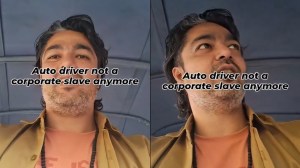There is a little ‘angel’ in the neighbourhood of horror
In the neighbourhood of the House of Horrors in Gurgaon where Amit Rout performed illegal kidney transplants stands another house.

In the neighbourhood of the House of Horrors in Gurgaon where Amit Rout performed illegal kidney transplants stands another house. As Rout’s dark secrets tumble out, residents of this house pull out what looks like a giant family album.
The first page has a photograph of a smiling Aman Jain and under it the words: ‘My Angel’. On the second page is a photograph of Aman as a newborn, cradled in his grandmother’s lap. Each page records a chapter in the life of the 14-year-old—his birthday parties, the prize he won in a contest, outings with his cousins and a short stay in a boarding school. It ends with a photograph of his taken in April 2005 in the ICU, where he lay comatose after an asthma attack, his face covered with tubes, his walkman by his pillow.
As he lay in hospital, his mother Mamta decided he would be an ‘Angel’. When for two days, he showed no sign of reviving, she walked up to the doctors and said she wanted to donate her son’s organs. The unusual request threw the hospital staff at New Delhi’s Gangaram Hospital in a tizzy. They had some sort of a list of patients waiting for organs but it took them two more days to get the recipients together. Ten teams of surgeons worked all night. In all, 11 people got life from the organs donated by Aman.
It was an act of courage seldom shown by families in India. An act of individual courage that holds a glimmer of hope for a campaign to take the message of organ donation to the country.
India has the lowest rates of cadaver organ donation and the result is a huge gap between demand and supply, allowing men like Rout to step in to fill the demand by illegal means. The law allows two kinds of donations —donated by blood relatives or by cadaver donations from the ‘brain dead’.
“We have to try very hard with other families and yet we do not succeed. Most refuse on the plea that Hindu mythology does not allow body parts to be taken away. Even if we get a rare success, we feel happy,” said Dr S.C. Sharma, a transplant coordinator at Gangaram Hospital who has had success in six cadaveric donations in the last five years.
The Jains, however, have always been sensitive to the issue. “I had read about organ donation. We had donated eyes of our in-laws,” said Mamta. “When my son was in hospital, we thought if he didn’t make it, at least he can help others live,” said his father Arun, a textile industrialist. The immediate family did not object and the rest did not matter, they say.
“We were amazed to see how little infrastructure was in place to get recipients. There was no centralised list. In fact, we were told that the liver hardened and could not be used before the right person could be flown in from Bangalore,” said Arun. This is when this particular hospital has the infrastructure and the committees in place.
For organ donation, the patient has to be declared “brain dead” by a committee of four doctors on a standard set of parameters. Most hospitals in India do not even have this committee in place. Once a decision to donate organs is made, the heart is kept beating in order to keep the organs flushed.
The response to the Jains’ brave gesture has been overwhelming. “We only realised we had done something special when hundreds of people wrote to us, phoned us to thank us for what we had done,” said Arun.
Despite their immense loss, the Jains got on with their life. Their eldest daughter got married and the second daughter joined college. For several months, Mamta worked on putting the album together, adding photographs and pasting the sympathy letters in the end. She has written poems for her son, even an imagined letter from Aman addressed to her, asking her not to grieve for him.
The illegal kidney transplant scandal has brought back memories of their son’s death and their decision. “The government has to get more realistic about these laws. In addition to a massive awareness generation on the need to donate, they should legalise the sale of organs. There is a need that has to be met and it should be legalised in some form,” said Arun. His wife agrees. “There are several people like us who may want to donate if someone were to ask them,” said Mamta.
India follows the system of ‘opting-in’ which means that the relatives have to agree to donate unlike the ‘presumed consent’ in Spain, Belgium and Austria where the government presumes you want to donate unless you register an objection.
For the Jains, it’s back to the memories of their son. Aman loved cars and cricket, just like any other 14-year-old. But in his death, he did what few have done in India-given life to 11 people.


- 01
- 02
- 03
- 04
- 05





























